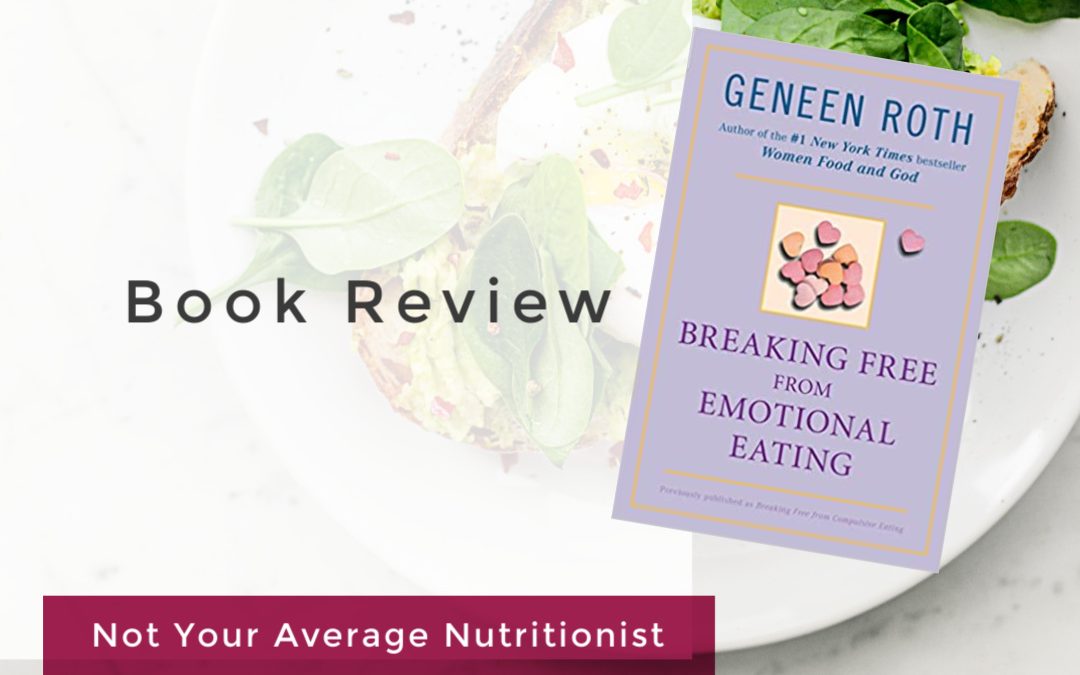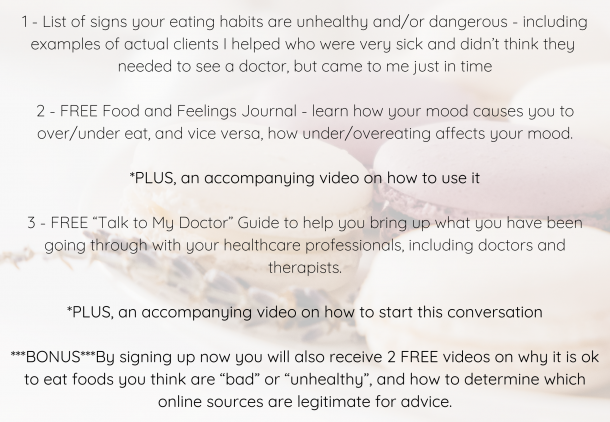Geneen Roth, the author, is a well-known author and teacher of workshops on how to stop eating for emotional reasons, and eat when you are truly hungry. Much of the book is the author’s personal experiences with emotional eating and weight gain/loss, and the experiences of her workshop participants. This book delves into this topic, with questions for the reader and theories derived from her experience, particularly as it pertains to women. Some take-away messages from this book are:
* Eat what you want when you are hungry for it. No more depriving yourself, dieting, telling yourself you can’t have ___. If you eat when you are truly hungry you can eat anything. That’s right – anything!
* Learn your individual hunger signals. What is the physical feeling of being: starving? hungry? satisfied? could eat but feel ok? full? over-stuffed? How does your body react before it reaches these stages?
* Don’t eat “by the clock” but rather when your body tells you to. If you must due to someone else’s schedule (dinner out, etc.) eat a light snack if you are hungry to keep from getting ravenous, then eat until you are satisfied but not stuffed. Take the leftovers home, let someone else have them, throw them away. Don’t worry about “cleaning your plate.”
* Eat without distractions. Pull up a chair. No TV, computer, book, whatever, just you (and/or other people) and the food.
* Eat what you really want. If you want a specific food – have it. Nothing else is going to satisfy that craving, and ultimately you are going to end with that food if you try to eat other things first because other foods won’t satisfy that specific craving. Also think about if what you are hungry for is not food. Are you hungry for attention? Love? Physical touch?
* Figure out what emotion is causing you to eat when you are not hungry. Is it “something to do” when you are bored? Are you trying to fill loneliness or a lack of feeling loved? Are you eating out of anger at someone? Use these findings to do something besides eat. For example, if you are lonely call someone or write a letter to a friend.
* “Remember you will not gain 10 pounds from one meal…most of us miss our own lives [waiting to be thin]. Most of us spend our time preparing for a moment that never comes, while the years slip by unnoticed.”
* “Eat when you are sitting down; and that does not include the car.” Eat in front of people, eat in as lovely of an environment as you can, and when you eat avoid emotionally charged conversations.
* For those who eat in secret, ask yourself: “If _[person]_ really knew what I ate or wanted to eat…..” and, “I sneak food because…..” Take your time with these questions. Would your family and friends think you are less attractive? Probably not. Who are you sneaking food from? Why?
* Eating without distraction is hard. Transition slowly. Choose one meal a day to eat without distraction. If you are uncomfortable try to figure out why that is.
* Take time for yourself like you would for a friend. Make dining an attractive experience. Indulge yourself in non-food pleasures. A bubble bath, a fun magazine, time spent doing nothing. This is not a bad thing – this is recharging.
* “Everyone has their own definition of what is wasteful. It seems to me that loading a body with food it doesn’t need is the same as throwing it away, and just as wasteful.”
* “Binging can be an urgent attempt to care for yourself when you feel uncared for.” When what we really want is to do nothing, binging allows us to say we are “doing something” (eating) that is socially acceptable; when what we really need is to indulge ourselves in the way we feel we are lacking. Binging is not a lack of willpower, but a sign that you need to “give yourself more, not less (food, attention, love, etc.).”
*Parents should not comment on their children’s weight, or talk about weight or dieting around their children. Be sensitive and aware of what you say and do. You cannot protect your children from pain, but you can let them help with grocery shopping and cooking, and make meal-time a good experience.
*When going back to your childhood home, pay attention to any “reverting back to how you ate” or feelings about food/eating with people. Many people find themselves eating like they did as a teenager or sneaking food when they go back to visit their parents.
*”As long as you are eating emotionally, your anxiety will be about food. When you stop, you leave room to discover the worries and concerns that prompt you to eat. When you discover what they are, they change. Because they are no longer secondary and unnamed fears you can act on them instead of being ruled by them.”
*”When someone does think negatively about you, that judgment is a reflection of them and their values; it has little to do with you.”
*”Eating out is a treat for which you are paying money. If you are not sure about what is in a certain dish, ask.”
*At potlucks/dinner parties, limit yourself to 3 dishes on your plate. Eat, savor, if you want seconds, again, only take 3 items. Do this as many times as needed. By limiting to 3, it gives you some structure, and you are not as likely to overdo it.
*”The danger with compulsive exercising is that we begin to rely on something other than ourselves to monitor our “goodness” and our “badness.” We’re good when we exercise and bad when we don’t.” It is not all or nothing.
*”I didn’t want [ex-boyfriend]; I wanted to be attractive…When I weighed [high weight], I was in control. People couldn’t reject me; I had already rejected myself. I knew I was fat, I knew I was unattractive. They couldn’t like me less than I already liked myself.”
*Make lists to define the good parts of being “overweight”: 1.”Being fat enables me to…” 2.”Being thin means I can’t…” 3.”I am waiting to get thin to…” What are you waiting for?
*Work for awareness, not judgment. The difference is the former eat and go on with their day, the latter eat and let it ruin their day. “The difference is not in the action, it is in the attitude about the action.”
*Make friends with your body. Touch it gently, rub lotion on yourself, take care of your body, exercise, dress in clothes that fit NOW, get a massage, take a long relaxing bath, journal, see a therapist if you need to, forgive yourself, express anger in a healthy way (not by eating).
*”We spend at least half our lives in either physical or emotional discomfort, yet we persist in believing that happiness is our natural, normal, condition and that when we are not happy we’re not normal.”
*On reaching puberty: “We learned fast that breasts and hips got you in trouble…Better to erase any signs of womanhood. Better to be fat [or thin like a boy with no curves] than to be sexual… Emotional eaters are givers…for sex to be satisfying, we must receive, not just give, pleasure.” This is not an open invitation to overdo it on sex either, balance is key. “I respect my appetites for food and sex, and trust that if I say no today there will always be either kisses or cookies tomorrow.”
*”When you stop dieting you stop being compulsive…when I binge it is usually an indicator that I am unwilling to feel, express, or act on what I am feeling.”
You can get the book HERE


